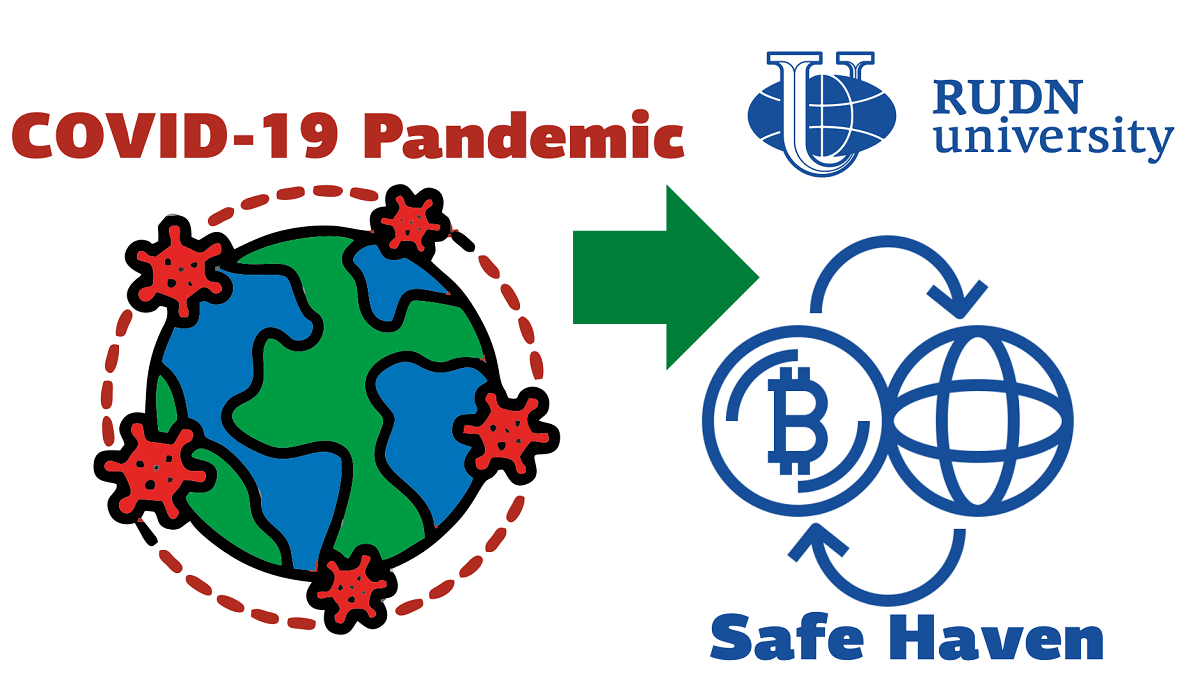RUDN economists have chosen the best cryptocurrency for investments during the pandemic

Due to the crisis in 2020, oil futures turned negative for the first time in history, gold prices fell, and oil prices fell to the 1985 low. The oldest of the American market indices, the Dow Jones Industrial Average, fell by 40% from February to March 2020. In difficult times, in search of growing markets for investments, many investors pay attention to cryptocurrencies. But can they be considered a “safe haven” while other sectors of the economy are storming, or is it too risky? Researchers from the RUDN analyzed the behavior of the cryptocurrency market during the COVID-19 pandemic and found the cryptocurrency that can be called the most promising.
“We wanted to find out if the cryptocurrency market can be called a safe sector that will not be affected by the crisis during the pandemic. We were also wondering which cryptocurrency is best suited for hedging — that is, it allows you to ‘insure’ your investments against sharp price spikes. To do this, we examined the reaction of cryptocurrencies to changes in gold and oil prices during the first wave of the pandemic and compared it with the general reaction of financial markets,” — Elena Grigorieva, Doctor of Economics, Deputy Dean of the Faculty of Economics, RUDN University.
For the calculations, the scientists used the least squares method, as well as an assessment of stable regression and an analysis of quantiles — values that a random variable does not exceed with a fixed probability. In addition, the RUDN economists examined the connections and paired jumps of some cryptocurrencies, the values of which were dependent on each other. All this helped to create a complex global response index for COVID-19.
RUDN economists have found out that the cryptocurrency market cannot become a safe haven during a pandemic and offer opportunities for hedging. The study showed that most cryptocurrencies are risky assets in which it is easy to lose your investments. For example, Bitcoin and Ethereum have lost efficiency due to the crisis. The exception, which was confirmed by all the analysis methods, was the Tether token, which Tether Limited released on the Omni Layer platform. It turned out to be almost the only stable token, and its role in the cryptocurrency market resembled the role of gold in the world market.
“Tether has the characteristics of safe haven, while the rates of other cryptocurrencies remain too volatile and capricious. We urge you to treat such assets as very risky. However, our model and methodology will help to analyze other potential investments during the crisis period, which will help investors make a choice,” Doctor of Economics Elena Grigorieva, Deputy Dean of the Faculty of Economics of the RUDN for Research.
The results are published in the journal Sustainability.
Matilda Pavlovna Mityaeva was born in 1925. In November 1942, she volunteered for frontline duty. She participated in the Great Patriotic War from November 1942 to June 1945 as part of the 53rd Infantry Division of the 475th Infantry Regiment. She was wounded twice.
The team led by Sergey Zyryanov, Head of the Department of General and Clinical Pharmacology, became the winner of the All-Russian competition of scientific projects "Technologies for Human Health".
RUDN University constantly adapts to the changes of the modern world and responds to challenges flexibly. This allows us to keep the standard of a world-class research university. The sphere of science is no exception. Peter Dokukin, Head of the Research Division, presented the updated R&D Programme at the meeting of the RUDN University Academic Council.
Matilda Pavlovna Mityaeva was born in 1925. In November 1942, she volunteered for frontline duty. She participated in the Great Patriotic War from November 1942 to June 1945 as part of the 53rd Infantry Division of the 475th Infantry Regiment. She was wounded twice.
The team led by Sergey Zyryanov, Head of the Department of General and Clinical Pharmacology, became the winner of the All-Russian competition of scientific projects "Technologies for Human Health".
RUDN University constantly adapts to the changes of the modern world and responds to challenges flexibly. This allows us to keep the standard of a world-class research university. The sphere of science is no exception. Peter Dokukin, Head of the Research Division, presented the updated R&D Programme at the meeting of the RUDN University Academic Council.